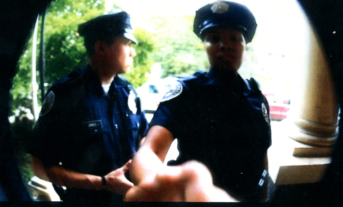Texas DWI Advice
WHAT SHOULD I DO IF I FIND MYSELF UNDER INVESTIGATION FOR A CHARGE OF DWI?
I am criminal defense attorney Carl David Ceder, and I have been defending the accused of all intoxication-related offenses (including those of DWI) for over a decade. It is for this reason why I believe I can provide you with all of the information you may need should you find yourself in the position of needing this advice.
Over 10,000 people a year are arrested for DWI in the Dallas-Fort Worth Metroplex area. The next individual could be yourself, the best way to handle if this occurs is to be prepared!
Let me preface this by saying our office DOES NOT encourage individuals to Drive While Intoxicated. In fact, we encourage everyone to follow all the law in the State of Texas. Afterall, I drive on the same roads everyone else does. This being said, the most surefire way to avoid a charge of DWI is to NOT drive after consuming ANY amount of alcohol!
One thing you must realize is that when you are arrested, the police will try and take full advantage of you in every possible way. They will try to use your ignorance against you, and they will also do everything they can to arrest you and punish you to the highest extent possible. The police have a written idea of what they are going to do and why, and this has been derived from decades of experience. Their plan is thorough and if you are someone who occasionally drinks and operates a motor vehicle, then you would be very wise to try and develop a firm understanding of how the process works.
Rule One: Politely Refuse all Tests
The first thing that you need to realize is you have the ability to refuse ALL tests, both the standardized field sobriety tests (hereinafter referred to as “SFST’s”), as well as a chemical specimen of either breath or blood. It is integral that you manage this in the most polite way possible. Do not get belligerent or rude with the police officer.
Typically, the officer does a series of field sobriety tests at the scene. There are three standardized and validated field sobriety tests including the Horizontal Gaze Nystagmus (HGN) test, the Walk and Turn test, and the One Leg Stand test. Simply put, the SFST’s are designed for failure. There is a myriad of different reasons for why any given individual may not be able to walk a straight line, or stand on one leg.
Technically speaking, an officer is supposed to base his arrest decision solely on how well you perform on these tests. In theory, however, the officer will make a decision on whether to make an arrest or to let you go based on his assessment of the tests performed. However, it is very seldom that once asked to perform the SFST’s an individual is actually let go (and not arrested). In reality, they are just trying to gather and obtain more evidence to try to help prove intoxication later in court.
Once an arrest for DWI has been made, an individual will be read a set of warnings and asked whether they would like to voluntarily give a chemical specimen of breath and/or blood. It should be noted that an individual is already arrested at this point – and the police officer cannot make the decision to “un-arrest” the suspect.
If the individual refuses to give a chemical specimen when asked, then a search warrant may be obtained to conduct a blood draw. However, if consent is voluntarily given for a chemical specimen, then the investigating officer does not need to go through the procedure of obtaining a blood search warrant. In this instance, an individual will give a chemical specimen, and then processed be into jail. It’s then a matter of waiting for bond to be set by a magistrate judge, and then bail can be posted securing a release from jail.
If an individual refuses their consent to a chemical specimen test, the investigating officer will then begin drafting a probable cause affidavit to submit to a magistrate or Judge a request who is on call for a blood search warrant… The magistrate will then review the contents of said warrant, and is then tasked with making a determination of whether there is sufficient probable cause to issue a search warrant to take the blood sample. If the blood search warrant is granted, then the investigating officer will then begin the process of obtaining a specimen of blood. After administering the blood draw, the hospital will then release the vials to law enforcement and he or she is then responsible for transporting the sample to the laboratory.
From there the lab takes over and analyzes the blood using Headspace Gas Chromatography.
Regardless, a person should REFUSE to give a specimen of breath and/or blood voluntarily. In fact, one CAN – AND….SHOULD REFUSE TO GIVE A CHEMICAL SPECIMEN OF BREATH OR BLOOD if arrested for a DWI. The law clearly states that one can choose to NOT give a voluntary chemical specimen of breath or blood. “Recent Texas and United States Supreme Court cases have mandated that – without proper exigent circumstances – a police officer MUST OBTAIN A SEARCH WARRANT if an individual DOES NOT voluntarily consent to give a chemical specimen.
There is a myriad of reasons for why one should exercise their right – and “CHOOSE TO REFUSE.” One reason is the very real and distinct possibility that some error may occur in the legal process of obtaining a search warrant. Another possibility is that all of the requisite legal items that are necessary to properly obtain a search warrant may not be able to be achieved.
If a search warrant is obtained, do not argue with an officer, be polite, and strictly maintain that you are not giving your consent voluntarily. If they do obtain a search warrant, the reality is that it will take significantly longer – and it may be as long as a couple, or even a few hours, before they legally obtain everything required before the blood draw takes place.
During this time period, usually alcohol will eliminate from your system, and in all likelihood – your “BAC” – your “Blood-Alcohol Content” Level will be lower than at this point, compared to if you had just given your voluntary consent initially. If they do get a search warrant, an experienced DWI attorney can examine its contents to scrutinize if it meets proper legal standards. If all necessary and legal requirements are NOT MET, the search warrant can be attacked in court.
Rule Two: SAY AS LITTLE AS POSSIBLE
Say as little as possible to the investigating police officer. Do and say things verbally that will give the appearance of sobriety when viewed on a video later by a Judge or Jury. Conversely, avoid saying or doing anything that may make you appear intoxicated or drunk! Try to say as little as possible. “Yes, sir” and “No, sir” is the best answers (or Ma’am as the case may be). Those answers are short, polite, and impossible not to understand. When you do speak, focus on speaking very clearly. Slurred speech is a sign of intoxication. Clear speech tends to indicate sobriety.
When it comes to contesting a DWI case, many individuals are actually convicted based upon more of what they say than what they do. There are several legitimate reasons why a person can’t walk a straight line, balance on one leg, but there aren’t many excuses for why a person has incredibly slurred s[eech, is not able to come even remotely close to being able to recite the alphabet or count backward.
When being investigated for a charge of DWI, officers love to pose the question to those under investigation what I deem the “trick DWI question.” When doing this, investigating officers usually say something to the effect of, “we are just going to do some tests, and I’m going to ask you a few questions – just to make sure you are okay to drive home. No big deal.” After the officer gains your compliance, usually after you finish performing the requested standardized field sobriety tests( the physical balancing tests and the HGN “eye” test), many officers will continue to take advantage of a person’s natural desire to be respectful, polite, cooperative and will casually ask, something along the lines of, “On a scale of 0 to 10, what do you think your intoxication level is right now? If zero is you are totally sober, and 10 is very intoxicated, where would you say you fall on the scale right now?”
In my experience, even when people are NOT intoxicated, they will give some number OTHER than zero. It is a trick question because any number OTHER than zero is an admission that you feel impaired. Because it is a scaled question, most people will give some answer within the range, because it is natural to give a response of a 3, maybe 4, or even a 5….somewhere in the middle.
The question is a “trick question” because any answer you give that is NOT a zero will be considered intoxicated for purposes of DWI. It is a complete trap when asked, as usually the investigating officer asks it in a very low key manner as if the answer doesn’t have perilous consequences. The investigating officer is aware that most people want to be respectful and compliant. They are fully aware that most lay people don’t know the legal definition of the word “intoxicated” under Texas law. Moreover, they certainly are going to define or explain it to the individual under investigation. Additionally, the words when asked can usually be open to a wide degree of interpretation. To this end, many individuals assume that the officer is asking in terms of a numerical level. (i.e. .08 or more alcohol concentration).
Under Texas law, intoxication is defined as “not having the normal use of mental or physical faculties by reason of the introduction to alcohol, a controlled substance, a drug, a dangerous drug, a combination of two or more of those substances, or any other substance into the body; or (B) having an alcohol concentration of 0.08 or more. Therefore, if one answers in any way other than zero – it is a self-admission to being impaired under Texas law, even if they respond with a low number, because any loss of their normal mental or physical faculties would technically dictate that one is admitting to some impairment, even if it is very slight.
When we drink alcohol, we usually feel some effect or sensation.
However, it is important to remember it is not illegal to “drink and drive”- it is only illegal to “drive while intoxicated.” Texas law allows for one to consume as much alcohol as they want, it as long as they do not lose the normal use of their mental and/or physical faculties. The question above does not allow the accused a way to tell the officer, “I’ve had some alcohol, but I’m not intoxicated”. This question is fundamentally unfair by the mere wording of how it is asked. So, if you are ever asked this question, and you think you are under suspicion for Driving While Intoxicated – ALWAYS ANSWER ZERO.
Rule Three: Be Polite
Simply put, don’t be Don’t Be Rude or Uncooperative. As an upstanding citizen, be as nice and respectful as possible. Judge and/or Juries who may be evaluating your case later do not like jerks. There is literally no reason to treat the cops rudely and it will always end up making things worse. You have the right to remain silent – so employ it! It cannot be stressed enough the importance of this rule.
Do not talk! Don’t try to convince the officer of your innocence. It’s absolutely a fruitless endeavor. Everyone is innocent, no one should be arrested, and no one should be in jail is all the officer hears all day, every day. Generally speaking, they do not care generally whether you are innocent or guilty. In fact, there is nothing they can do at this point to undo their decision to arrest. He or she only needs “probable cause” to believe you have committed a crime in order to arrest you. They do not decide your guilt and he actually doesn’t care if you are innocent or not. It is the job of the judge or jury to free you if he is wrong. Most times, when people speak to officers they say something that makes their situation far worse. Keep your mouth shut; there will be plenty of time to talk later. If you feel that urge to convince him he’s made a mistake, remember the overwhelming probability that instead you will say at least one thing that will hurt your case, perhaps even fatally. It is smarter to save your defense for your lawyer to fight.
Rule Four: Stay In Control (Realize you are on video)
It very important to stay in control throughout the duration of the investigation. Always keep at the forefront of your mind that a video is most likely being recorded of the incident, so try and appear alert and aware at all times.You are being recorded even when you are in the back of a police car during the ride to the station. This includes the ride to jail, so always keep your mouth shut, and try to stay alert and awake. It always helps to keep your eyes open as well and to sit up as straight as possible. Remember that everything Is likely being recorded. So even little things like stumbling or being unable to maintain balance at the beginning of the investigation could be things construed as signs of intoxication. At the station, usually the police officer will have you stand in a little square box while he reads you the required DIC statutory warnings, or perhaps just does other business. They record this, in the hope that you will do something that may be a sign of intoxication, like not being able to stand straight up, or having to balance on the wall.
As noted previously, try to say as little as possible. “Yes, sir” and “No, sir” is the best answers (or Ma’am as the case may be). To reiterate, these are optimal responses to give as answers because they are short, polite, and impossible not to understand. When you do have to speak, focus on doing so in a manner that is very clear. Slurred speech often is attributed to being a strong sign of intoxication. Clear speech, on the other hand, tends to indicate sobriety.
It also helps to avoid getting emotional over what is happening. Many individuals cry, complain, or act extremely agitated for having to go through this experience (understandably so!). Always remember that Judges and Juries are going to be evaluating you say and do, in addition to how you appear on the video. Therefore, when you have to speak, do so as the consummate professional gentlemen. Do not curse the officer, or rant and/or rave about the injustice of being arrested. Again, stay quiet and stay in control! If you stay in control, you most likely will appear in a normal fashion. It cannot be stated enough how appearing “normal” is the absolute key to success! If you lose control of your emotions or physical appearance, it very well could mean the difference in winning or losing your case!






















